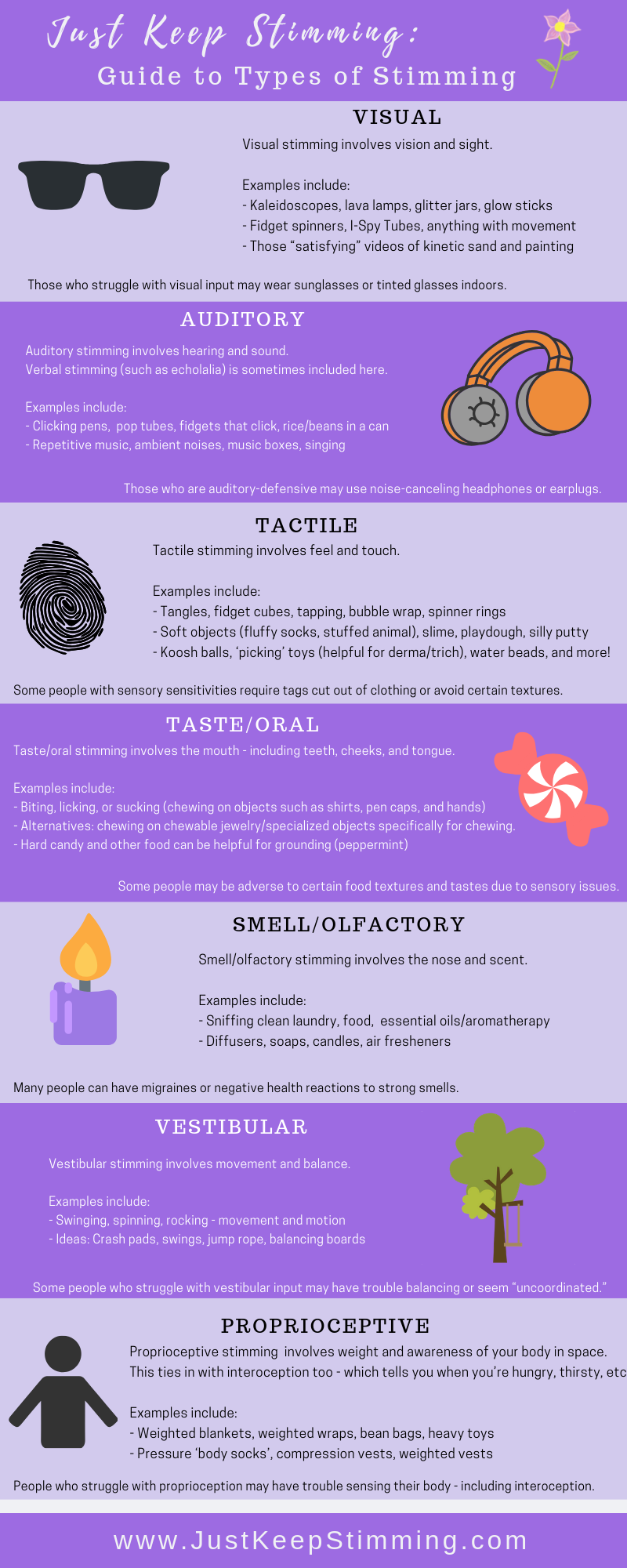Stimming or self-stimulating behaviour includes arm or hand-flapping finger-flicking rocking jumping spinning or twirling head-banging and complex body movements. Examples of stimming include.

In a person with autism stimming might involve.

Autism stimming examples. The DSM-5 even includes stimming as a diagnostic criteria for the disorder. High-functioning autism isnt a medical term but many people still use it. Stimming a kind of repetitive behaviour meltdowns a complete loss of control over behaviour Some autistic children can also be physically or verbally aggressive.
Some examples of stimming are rocking spinning pacing repeating words or flapping of arms or hands. Stimming behaviors can provide comfort to autistic people. Autism Stimming Examples - YouTube.
Stimming is commonly associated with autism says Dr. Bouncing jumping or twirling. Pacing or walking on tiptoes.
Any kind of repetitive movement. Their behaviour can be harmful to themselves or other people. It is almost always a symptom of ASD.
Common forms of stimming that many of us do but are less obviously recognized as stims. When people with autism stim they might do it. These actions may look odd but they differ because they are associated with a persons behavior.
Biting your nails when you feel anxious Twirling your hair when you. Hand and finger mannerisms for example finger-flicking and hand-flapping. So in short stimming is often done to block unwanted sounds or visuals through distraction or to.
The actions associated with stimming related to autism may include actions that are noticeable such as finger flicking pacing tapping their face or arm with their fingers or flapping their hands. I engaged in different types of stimming as a child and adult such as rocking clapping hair picking pacing counting repeating a song or. While these behaviors are often used to diagnose neurodevelopment issues they are also common for children who are developing typically.
Autistic people of any age may stim occasionally or. Stimming is characterized as repetitive motions that you may use to help you cope with emotions. Autistic people arent the only ones who stim although occasionally people on the spectrum stim in more obvious ways and may attract attention.
At its heart stimming is a way to self-regulate. That said even typical adults may exhibit repetitive movements such as jiggling a leg drumming fingers on a table or chewing on the cap of a pen in concentration. They may also have an intense interest in a particular band or sports team much like autistic people do in train schedules or butterfly taxonomy.
About stimming and autism. If playback doesnt begin shortly try restarting your device. 8 Types of Stimming That Help Autistic Adults.
Flapping hands or flicking or snapping fingers. Stimming or self-stimulatory behaviour is repetitive or unusual body movement or noises. The repetitive sound she says is a good example of a stim outside of the context of autism.
They can vary in intensity and type and can occur due to a variety of emotions. This is often the first outward sign others may notice. Well explain what it usually means and how its different from and similar to Aspergers syndrome.
Hallmark Marker for Autism Spectrum Disorder ASD The term stimming is short for self-stimulatory behavior. The term stimming is a shorthand used by the autism community to describe repetitive self-stimulatory behaviors like hand flapping or rocking. Spinning pacing rocking twirling jumping etc.
The term stimming is a shorthand used by the autism community to describe repetitive self-stimulatory behaviors like hand flapping or rocking. Unusual body movements for example rocking back and forth while sitting or standing.
